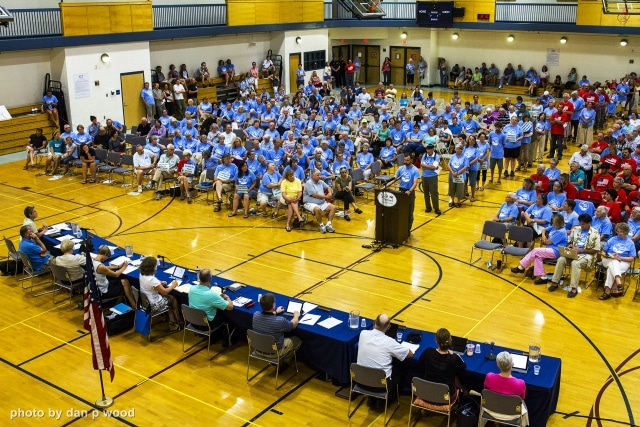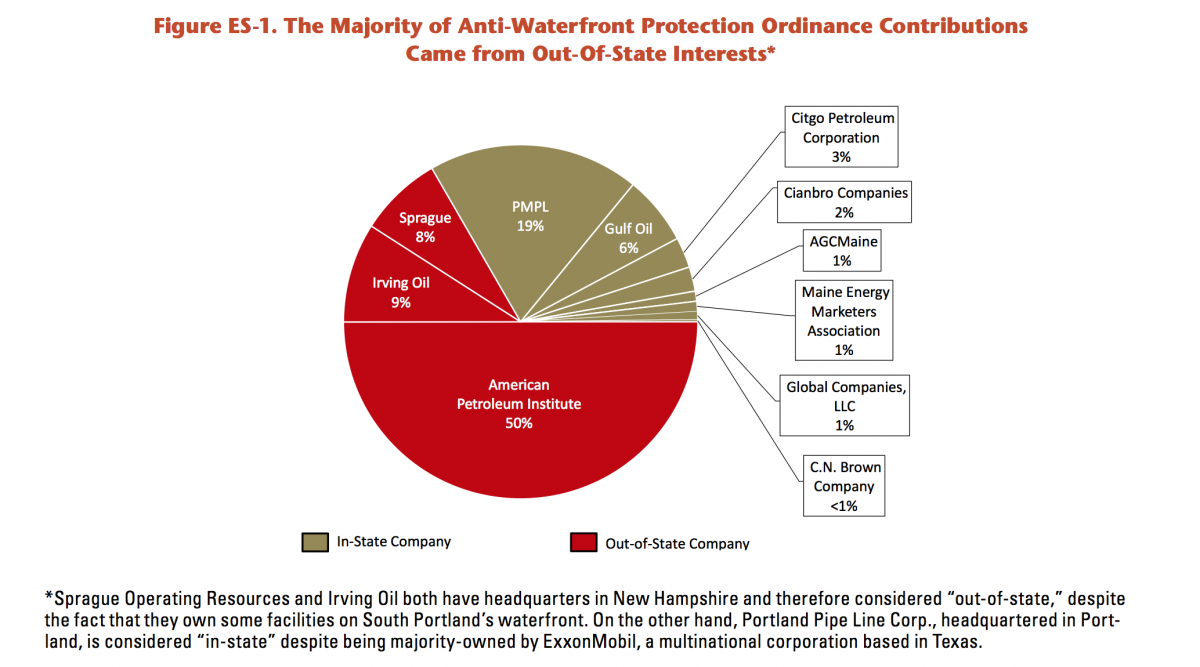Portland, Maine, has become the latest battleground in the fight against tar sands oil, with local residents facing off against energy industry forces in an attempt to ban tar sands oil from the city’s port.
The South Portland Clear Skies Ordinance, would ban tar sands oil from being loaded on to ships at the local port. City council will take a final vote on the measure today.
Three weeks ago, about 200 people attended a presentation on the proposed ordinance, many wearing blue “clear skies” t-shirts to show their support. Only three people spoke against the ordinance at that meeting.
But on July 7, when many of the same 200 people in blue t-shirts showed up at the meeting when the city council was set to vote on the ordinance, they were met with a surprise. The meeting room was packed with people in red shirts that read “American Energy” on the front and “SoPo Jobs” on the back.
It quickly became clear that there were far more people than fire codes would allow. Members of the fire department began asking people to leave, but met with resistance as one local grandmother replied, “Young man, I’m not going anywhere.” The meeting was postponed for two days and moved to a local gymnasium.
At the rescheduled meeting on July 9th, after hearing from a long line of commenters, the large majority who were in favor of the ordinance, the council voted 6-1 in favour of the ordinance.
One of the speakers expressed her dislike over attempts by the American Petroleum Institute to influence South Portland’s democratic process.
She was referring to the campaign that was financed by the American Petroleum Institute and other oil industry players to influence the outcome of a referendum to ban tar sands in South Portland in October of 2013. The referendum was the result of local activists gathering almost 4,000 signatures in their city of about 25,000 to get the issue on the ballot. However, once it was on the ballot, the effort gained the attention of the oil industry.
The American Petroleum Institute backed a professionally run public relations, voter outreach and get-out-the-vote effort to urge citizens to vote against the referendum. In mailings and open letters to the residents of South Portland, the campaign claimed that there were no plans to bring tar sands to South Portland. One stated:
Some of you may be concerned about tar sands, which may have prompted you to sign a Waterfront Protection Ordinance petition. But the ordinance is not about tar sands.
In addition to saying the referendum had nothing to do with tar sands, the messaging included one of Big Oil’s favorite points — jobs. They claimed the ordinance would shut down the port’s existing oil operations and cost local people their jobs.
According to a report published by Environment Maine Research and Policy Center in June 2014 titled, Inside the Big Oil Playbook, the API-backed effort spent $750,000 to defeat the South Portland ballot measure. The measure was defeated by fewer than 200 votes.
And despite the claims that there were no plans to bring tar sands to South Portland, after the vote, ads were run in local papers by the group Energy Citizens, a front group for the American Petroleum Institute, that claimed tar sands oil was, “Just Oil. From Canada. Safe Reliable Oil from our Neighbors to the North.”
On July 9, among the few commenters who opposed the ordinance was David Manning, a “Neighbor to the North” representing Alberta, the province where the tar sands are produced. Manning is serving as Alberta’s representative in Washington, D.C., and is committed to expanding the trading relationship Alberta has with the U.S. The Alberta government website goes into detail on Manning’s responsibilities:
Perhaps the most critical role identified is to build a constituency of Alberta supporters in the U.S., U.S. based companies, institutions, and individuals who influence the decisions of U.S. governments [and] are critical to Alberta’s network of support for future growth and unfettered market access.
It would appear that his responsibility to ensure “unfettered market access” is what brought him to South Portland. Another fun fact included in Manning’s bio is the fact that he was once the president of the Canadian Association of Petroleum Producers.
Manning made several points in defence of oil sands in his three minutes. He described Alberta as a “tourist mecca” and said “we take the environment very seriously.”
Subscribe to our newsletter
Stay up to date with DeSmog news and alerts








